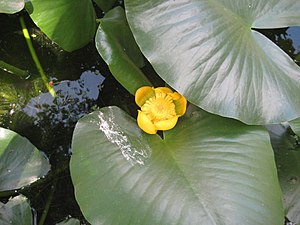Note: This is a project under development. The articles on this wiki are just being initiated and broadly incomplete. You can Help creating new pages.
Difference between revisions of "Nuphar advena - Yellow pond-lily"
Chaithrika (talk | contribs) m (Chaithrika moved page Yellow pond-lily to Nuphar advena: renaming as per convention) |
Chaithrika (talk | contribs) (+Common names) |
||
| Line 8: | Line 8: | ||
Spatterdock was long used in traditional medicine, with the root applied to the skin and/or both the root and seeds eaten for a variety of conditions. The seeds are edible, and can be ground into flour. The root is edible too, but can prove to be incredibly bitter in some plants. | Spatterdock was long used in traditional medicine, with the root applied to the skin and/or both the root and seeds eaten for a variety of conditions. The seeds are edible, and can be ground into flour. The root is edible too, but can prove to be incredibly bitter in some plants. | ||
| + | |||
| + | ==Common name== | ||
| + | |||
| + | * '''English''' - Yellow pond-lily | ||
== References == | == References == | ||
Revision as of 13:01, 6 March 2017
Yellow pond-lily or Nuphar advena (spatterdock or cow lily or yellow pond-lily) is a species of Nuphar native throughout the eastern United States and at least some parts of Canada, such as Nova Scotia.[1][2] It is similar to the Eurasian species N. lutea, and is treated as a subspecies of it by some botanists, though differing significantly in genetics.
It is locally naturalized in Britain.[3]
Contents
Uses
Spatterdock was long used in traditional medicine, with the root applied to the skin and/or both the root and seeds eaten for a variety of conditions. The seeds are edible, and can be ground into flour. The root is edible too, but can prove to be incredibly bitter in some plants.
Common name
- English - Yellow pond-lily
References
- ↑ Nuphar advena
- ↑ USDA Germplasm Resources Information Network:Nuphar advena
- ↑ Nuphar advena
